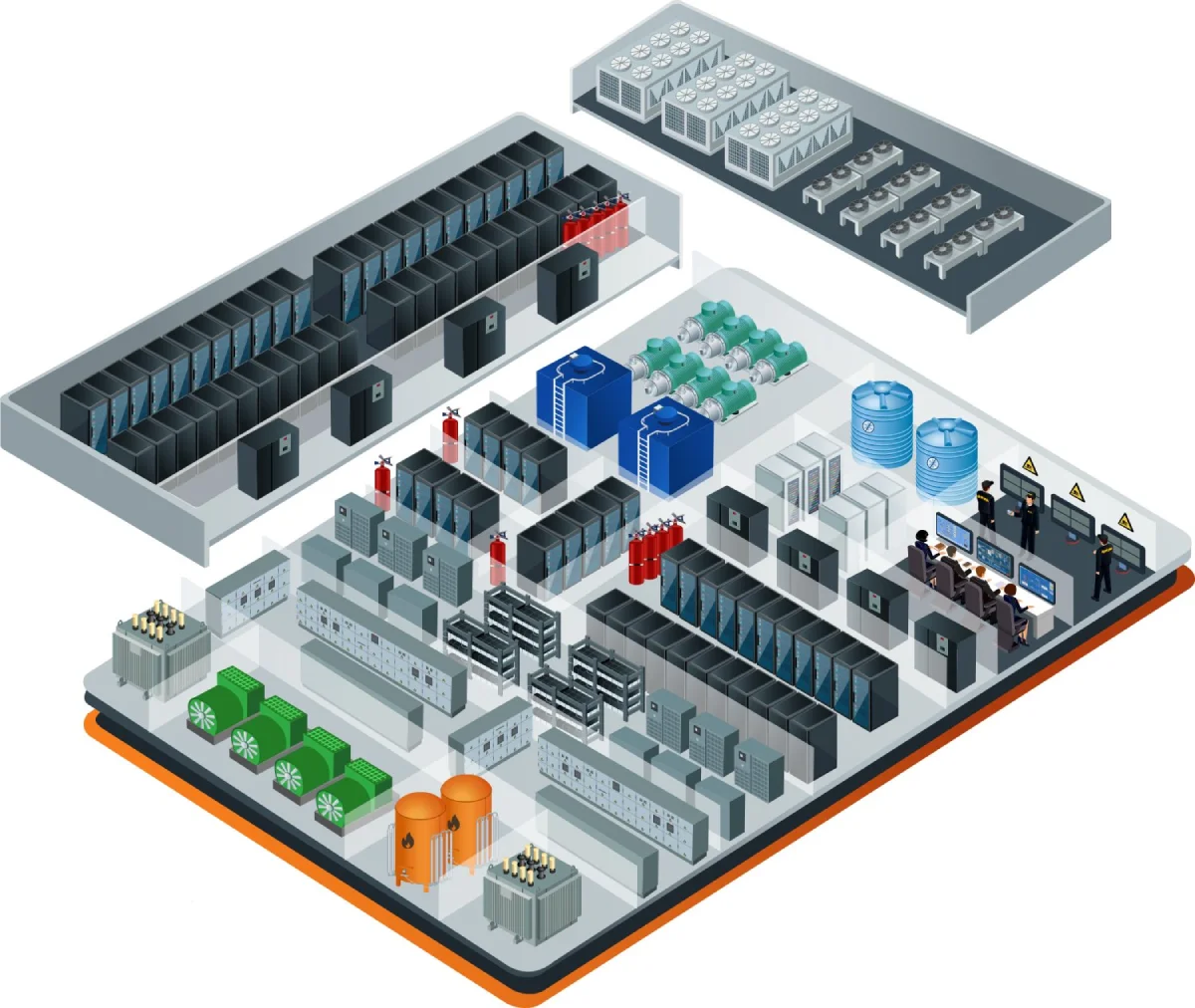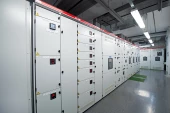Colocation in Kyiv
Colocation is a service provided by commercial data centers that involves the placement of servers and other client equipment in specially equipped premises. In essence, it is a lease of physical space in a data center rack. The client retains full control over his equipment, but at the same time receives a number of advantages provided by the data center.
The advantages of collocation are obvious. First, it is the highest reliability. For example, data centers that provide colocation services are equipped with uninterruptible power supply systems, backup generators, cooling and fire extinguishing systems, which ensures high availability of client IT equipment. Secondly, it is security – data centers have a multi-level security system, including physical security, access control, and video surveillance systems. Thirdly, it is convenience. Customers do not need to build and maintain their own data center, they just need to connect their equipment to the ready-made infrastructure.
Colocation is especially relevant for companies that need high availability and reliability of their IT infrastructure. When choosing a colocation provider, you should pay attention to such factors as the reliability of the engineering infrastructure, security level, Internet connection speed, cost of services, and additional services (monitoring and technical support).

Reliability level Tier III – Tier IV
- Component redundancy - N+1.
- Availability of services - 99.98%.
- Maximum allowed downtime - 1.6 hours per year. De Novo data center operates without a single shutdown during the whole period of its existence.
- Uninterrupted cooling.
- Two active resource allocation routes.
- Hot replacements for "vital" resources.
- The number of employees per shift: more than 2 engineers.
- Technical support in 24/7 mode.
- Allocation to screened dedicated modules.
DC FROM INSIDE

Shielded Module from inside

Rechargeable batteries

Modules air conditioning

Gas fire extinguishing

Electrical control room

Diesel generator sets
GET AN OFFER
What is included in server colocation services?
Colocation services, or server placement in a data center, provides companies with the opportunity to place their IT equipment (servers, storage systems, network systems) in a commercial center that ensures reliability and security.
But what exactly is included in this service?
First of all, colocation service includes the provision of physical space for IT systems. You rent a certain number of units in a data center rack, enough to accommodate your equipment, and possibly even one or more racks entirely. In addition, you are provided with the necessary communications: connection to the power grid, network channels, and cooling systems. The data center provides a reliable power supply with redundancy, which guarantees uninterrupted operation of your IT equipment.
An important aspect of colocation service is security. Data centers are equipped with modern physical security systems, such as video surveillance, access control, and fire protection solutions. Colocation services often include professional technical support. The service provider's specialists monitor, perform preventive maintenance, and are ready to help in case of malfunctions. Many providers in Ukraine offer additional services, such as remote access, software installation and configuration, and data migration assistance.
How does the colocation procedure from any city in Ukraine to Kyiv work?
The procedure for transferring and installing servers to the Kyiv colocation data centre begins with preparation and planning. At this stage, a list of hardware components is determined, technical requirements are agreed upon with the data centre, and appropriate tariff plans and placement conditions are selected. The current infrastructure is also audited to ensure all systems are compatible with the new conditions. An essential part of the preparation is the execution of contracts with the data centre, agreement on access conditions, and security assurance.
The next step is to dismantle and pack the devices. They must be powered down, labelled, and packed according to transportation requirements. Special attention is paid to protecting sensitive components from mechanical damage, moisture, and static electricity. If the server contains critical data, a backup or encrypted copy of the information may be performed before transportation.
Next, the servers are transported to a colocation data centre in Kyiv. Specialised logistics companies with experience working with IT equipment are usually involved. Transportation is carried out in compliance with all precautions, including temperature control and vibration isolation. Upon arrival at the data centre, the equipment is checked for integrity and prepared for installation.
The final stage of colocation in Kyiv involves the installation and configuration of equipment in a new data centre. The equipment is mounted in racks and connected to the power supply and network infrastructure. Subsequently, test runs are conducted to verify the operability of services and connections. Once all checks are complete, the servers are operational, allowing for full-scale work to commence.
Colocation vs own data centre
Companies requiring a reliable and scalable IT infrastructure solution may find it challenging to decide between colocation and owning a data centre. Owning a data centre offers complete control over equipment, network architecture, and security policies but entails significant construction, maintenance, and modernisation costs. Companies opting for this choice must take into account the expenses associated with electricity, climate control, physical security, and the personnel necessary to ensure the infrastructure operates efficiently.
Colocation, in turn, enables you to place servers in a professional data centre, thereby reducing capital construction and operational costs. Customers gain access to a dependable infrastructure complete with reserved communication channels, power supply, and cooling systems. This is particularly advantageous for businesses that wish to focus on their IT services rather than managing the physical infrastructure. Furthermore, colocation data centres provide flexibility in scaling capacity, allowing you to swiftly adapt to changes in load.
From a security perspective, colocation data centres offer robust protection, including features such as video surveillance and biometric access. However, companies that utilise colocation data centres must ensure data protection, update deployments, and manage their infrastructure effectively. In this regard, colocation represents a compromise between the complete autonomy of having their own data centre and the convenience of employing cloud solutions.
The choice between colocation and your data centre depends on:
• budget;
• control needs;
• level of required capacity;
• strategic goals of the company.
Colocation can offer an optimal combination of flexibility and reliability for small to medium-sized businesses without incurring excessive costs. Larger enterprises with specific requirements for security and performance may view their own data centre as a long-term investment. It is crucial to consider not only current needs but also growth prospects, ensuring that the infrastructure can meet future business challenges.
Are colocation services safe?
Server colocation is regarded as one of the most secure methods for hosting IT infrastructure, as professional data centres provide a high level of physical and network protection. These facilities are fitted with access control systems, video surveillance, security measures, and multi-layered authentication processes. Furthermore, fire protection systems, backup power supplies, and climate control are employed, which reduces the risks associated with accidents or external threats.
The network security level in colocation data centres is also at the highest level. Operators often use modern technologies such as firewalls and real-time traffic monitoring systems to protect against DDoS attacks. This reduces the likelihood of hacking or unauthorized access to data. However, it is important to understand that although the data centre infrastructure itself is protected, the security of servers and stored information remains the responsibility of the client. Companies must independently configure encryption systems, access control and cybersecurity policies.
One potential risk of colocation servers is the possibility of the “human factor”. Most data centres have strict security procedures and access restrictions, but customers are advised to choose providers with transparent policies and high trust. In addition, hardware encryption and special security measures, such as blocking physical ports and monitoring access logs, can be used.
Overall, server colocation is safe if you choose a reliable provider and adhere to the best cybersecurity. Companies using this format should assess in advance the level of data centre protection, contract terms and their own data protection mechanisms. Competent security management will minimize risks and ensure the reliable operation of the IT infrastructure.
What is included in the cost of colocation services?
The cost of colocation services includes several key components that form the total price of placing server equipment in a data centre. The main factor is renting space in the server rack - the client can choose to place individual servers (in units, U), rent an entire rack or even a dedicated server room. The higher the price, the more equipment needs to be placed. Power density is also considered since more powerful servers require additional power supply and cooling.
Another essential pricing element is the cost of power supply and power backup. Data centres provide uninterrupted power supply using uninterruptible power supplies (UPS) and backup generators. Typically, the price of colocation services includes a fixed number of kilowatt-hours, and if the limit is exceeded, the client is charged additional costs. Providers can also offer flexible tariff plans that consider peak loads and energy consumption at different times of the day.
Colocation services include access to the data centre's Internet channels and network infrastructure. Providers offer various connection options, including dedicated channels with a specific bandwidth, protection against DDoS attacks, and the use of network routers. The cost may include basic technical support services, such as rebooting servers or checking devices at the client's request. However, additional work, such as installing new resources or replacing components, is usually charged separately.
Additional services may include rental of auxiliary equipment, monitoring, data backup and increased physical security. Some data centres offer hands-on support services when their specialists can perform technical work servicing the client's servers. The final price for colocation depends on:
1. The amount of space rented.
2. Energy consumption.
3. Internet speed.
4. Selected additional services.
This allows companies to form their IT costs depending on their needs flexibly.



